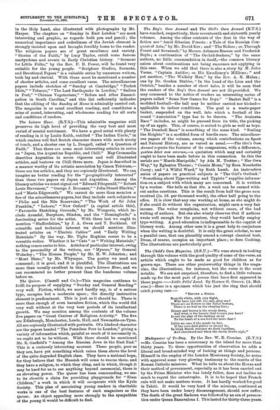The Boy's Own Annual and 2716 Girl's Own Annual (R.T.S.)
have reached, respectively, their seventeenth and sixteenth yearly volumes. Among the other contents of the first in the way of fiction are "Amid Siberian Forests : a Tale of the Russian Con- quest of Asia," by Mr. David Ker ; and "The Riders ; or, Through Forest and Savannah," by Messrs. Ashmore Russan and Frederick Boyle ; a continuation of "The Orchid-Seekers," by the same authors, no little commendation in itself—the common literary axiom about continuations not being successes not applying in this case. When we add that there is also a story by M. Jules Verne, "Captain Antifer ; or, His Excellency's Millions ; " and yet another, "The Wallaby Man," by the Rev. A. N. Malan ; one by Dr. Gordon Stables, "In the Land of the Lion and the Ostrich," besides a number of short tales, it will be seen that the readers of the Boy's Own Annual are not ill-provided. We may commend to the notice of readers an interesting series of papers called "Some New Games for Boys." "Basket Ball" is a modified football—the ball may be neither carried nor kicked— applicable to indoor conditions. The goal is a waste-paper basket, suspended on the wall, into which a football of the round " Association " type has to be thrown. "The Atalanta Race" includes, as might be guessed from its title, the picking up of an apple. This, of course, is suited to girls as well as boys. "The Dumbell Race" is something of the same kind. "Scaling the Heights" is a modified form of hurdle race. The miscellane- ous papers of the volume, among which contributions on Sport and Natural History, are as varied as usual.—The Girls Own Annual repeats the features of its companions, with a difference, gualem debet esse sorerum,—a quotation which may and certainly ought to have been made before in this connection. In this the serials are "Marsh-Marigolds," by Ada M. Trotter ; "Her Own Way," by Eglanton Thorne ; "Cousin Mona," by Rosa Nouchette Carey; and "A Wilful Ward," by Ruth Lamb. An instructive series of papers on practical subjects is "The Girl's Outlook." "Something about Type-writing and Typists" supplies informa- tion on a subject with which many are concerned. It is written by a worker. She tells WI that 30s. a week can be earned with- out undue exertions. This is the result from half the gross sum received (1s. 3d. per thousand words), the other half going to the office. It is clear that any one working at home, as she might do if she could do without the organisation, might earn a very fair income. The writer complains, not without cause, of the bad writing of authors. But she also wisely observes that if authors wrote well enough for the printers, they would hardly employ type-writing. A good education is indispensable to the copyist of literary work. Among other uses it is a great help to conjecture when the writing is doubtful. It is only the great scholar, to use a parallel case, that can plausibly amend a corrupt classical text. Dress, of course, occupies an important place ; so does Cooking. The illustrations are particularly good.


















































 Previous page
Previous page